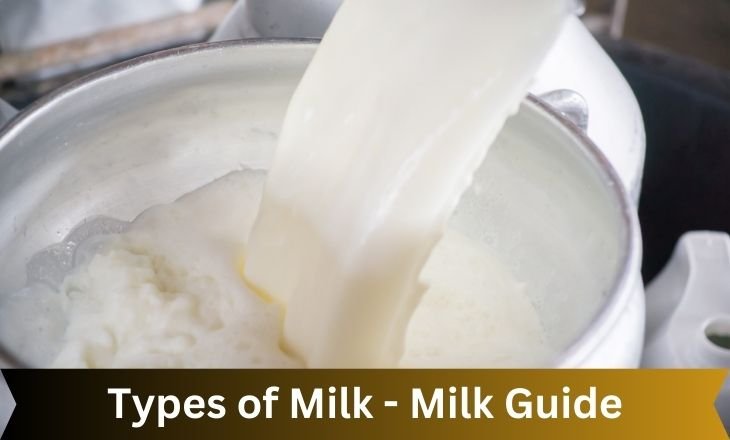Milk is common in many homes because of its creamy texture and versatility. Various types of milk are available, such as cow’s milk and plant-based options. Understanding these different types helps you make informed choices about what you drink.
This Milk Guide covers a range of milk, from almond to oat. Whether you’re lactose intolerant or curious about new milk options, this article is your go-to source for information on Types of Milk. Let’s explore the different milk varieties and find the best one for you!
Types Of Milk
Milk is a creamy liquid that people have been drinking for a long time. There are many types of milk, like cow’s milk and plant-based options. Almond milk is a popular dairy-free choice made from almonds and water.
It has a nutty taste and is low in calories but high in vitamin E. You can use almond milk in many recipes, like smoothies and baked goods. Let’s learn more about different types of milk, where they come from, and their benefits and flavours.
Organic Whole Milk
Organic whole milk is packed with nutrients that benefit your health, such as calcium for strong bones and teeth. The natural fats in whole milk can improve heart health by reducing the risk of heart disease.
Organic whole milk is produced on sustainable farms, prioritizing animal welfare and environmental conservation. Opting for organic whole milk is a healthy choice supporting the environment.
Low-Fat Milk
Low-fat milk is a healthy option with calcium and protein. It’s good for those who want to eat well without losing flavor or nutrients. You can use low-fat milk in various recipes, like smoothies and sauces, for a lighter option without sacrificing taste.
It’s easier for the body to digest due to its lower fat content, making it ideal for those with lactose intolerance or digestive issues. Pick low-fat milk for a creamy and smooth drink that benefits your body.
Skimmed Milk
Skimmed milk, fat-free or non-fat, has less fat than whole milk. It is a healthy choice that is still tasty and good for you. Skimmed milk is great for cooking and baking and can be enriched with vitamins and minerals for extra nutrition.
It is a good choice for those seeking more nutrients without too many calories. Also, the lower fat in skimmed milk makes it easier to digest for people with lactose intolerance or sensitive stomachs.
Lactose-Free Milk
Lactose-free milk is good for people who can’t digest lactose. It has the same benefits as regular milk but doesn’t cause stomach issues. It has similar nutrients and is a good choice for a healthy diet.
Many brands and types of lactose-free milk, like almond, oat, and soy milk. These options are not just for people with lactose intolerance but for anyone wanting to try different tasty and nutritious milk.
Flavored Milk
Flavored milk has many options and tastes, like chocolate, strawberry, blueberry, and banana. It adds a fun twist to the usual drink and can be enjoyed independently or in recipes. Mixing different flavors and ingredients can create new tastes.
Some brands offer seasonal flavors like pumpkin spice or peppermint. Flavoured milk is a tasty way to get extra nutrients and satisfy sweet cravings. There are always new and exciting flavors to explore in flavored milk.
Full Cream Milk
Full cream milk is rich and creamy, with the highest fat content among all types of milk. It has many health benefits, providing essential nutrients like calcium, vitamin D, and protein for bone health and overall well-being. Full cream milk is versatile in cooking, adding richness to dishes like creamy sauces, desserts, and baked goods.

Types Of Plant Based Milk
Milk is creamy and can be used in lattes and baked goods. Soy milk is rich in protein, calcium, and vitamin D. Plant-based milks have different varieties with unique health benefits.
Trying different plant-based kinds of milk can add variety to your diet and introduce new flavours. By exploring options beyond cow’s milk, you can find tasty alternatives that fit your lifestyle and provide wholesome ingredients.
Plant Oat Milk
Oat milk is popular because it is creamy and has a nutty taste. It is a good option for people who can’t have dairy and care about the environment. Oat milk is full of fiber, vitamins, and minerals.
It tastes sweet and can be used in coffee, smoothies, and baking. Many people choose plant-based diets for health and ethical reasons, making oat milk a top choice for a tasty and healthy dairy alternative.
Pea Milk
Pea milk is a plant-based milk made from yellow peas. It is becoming popular as a more eco-friendly choice than regular dairy milk. Pea milk is high in protein, has added calcium and vitamin D, and has a smooth texture and mild taste that goes well in coffee, cereal, and baking.
It is a good option for people with nut and soy allergies. As more people understand the environmental impact of dairy farming, pea milk is becoming a top choice for those who care about their health and the environment.
Other Type Of Milk
Most people know cow’s milk and almond or soy milk. But there are many other types of milk to try, like camel, oat, and hemp. Each type has its own flavor, nutrition, and cultural importance. Explore these hidden gems to change your daily routine and try something new!
Buffalo Milk
Buffalo milk is a creamy option with more protein and fat than cow’s milk. It has extra calcium and iron, which are good for bones and preventing anaemia. Buffalo milk is easier to digest for those with lactose intolerance or dairy sensitivities.
It contains smaller proteins that are gentler on the stomach. Buffalo milk also has more conjugated linoleic acid (CLA), aiding heart health and weight management.
Sheep Milk
Sheep milk is a healthy dairy with protein, calcium, and vitamins. It has a creamy, slightly sweet taste sets it apart from cow and goat milk. People are starting to like sheep milk more for its luxurious feel. It is also easier to digest for those with lactose intolerance because of its unique protein structure.
Camel Milk
Camel milk is a healthy dairy alternative with lots of nutrients. It has more iron, calcium, and vitamin C than cow’s milk, making it a good choice for people who want a nutrient-rich option.
Camel milk is easier to digest for those with lactose intolerance or dairy sensitivities because it has fewer lactose and allergenic proteins. Recent studies show camel milk can boost the immune system and fight harmful bacteria due to its antimicrobial properties.
This natural milk contains bioactive compounds that may help with autoimmune disorders and digestive issues. As more people focus on healthy foods, camel milk’s versatility and potential health benefits make it popular worldwide.
Is It Good To Drink Milk Daily?
Choosing the type of milk you drink every day can affect its benefits. Cow’s milk is common, but almond or oat milk has unique nutrients. Plant-based milk is lactose-free and full of vitamins and minerals.
Drinking milk regularly can help strengthen your bones and teeth because it has lots of calcium. It’s important to drink milk in moderation. The decision to drink milk daily depends on your preferences and needs. Trying different types of milk can help you find what works best for your body.

What Is Low Fat Milk?
Low-fat milk is a dairy product that contains less fat than whole milk. It has vitamins and minerals like calcium, vitamin D, and protein. Low-fat milk is creamy and tasty due to natural sugars. It is fortified with nutrients like vitamin A and riboflavin, making it a good option for a healthy diet without sacrificing taste or nutrition.
Type Of Milk Powder
Whole milk powder is created by taking water out of pasteurized milk. It contains 28% fat and gives a rich taste to food. Skimmed milk powder has less fat and is high in protein, lowering calories.
It is commonly used in baking for moisture without extra fat. Instant milk powder dissolves fast in water and is handy for travel or camping. Your selection of milk powder depends on your diet and how you intend to use it in cooking or baking.
Coconut Milk Powder
Coconut milk powder is a versatile, flavorful, non-dairy option made from coconut flesh. It has a long shelf life compared to canned coconut milk, making it a handy pantry item for occasional use. The powder is easy to store and carry, making it great for travel or outdoor activities. It can be used in various recipes to add creaminess without needing refrigeration.
Dry Milk Powder
Dry milk powder, or powdered milk, is useful in recipes and foods. It is long-lasting and easy to store, making it a good substitute for fresh milk. Dry milk powder is nutritious, providing protein and important vitamins like calcium.
It is commonly used in emergencies because it can last long and easily mix with water. Dry milk powder is for cooking, skincare, and cosmetics. It can moisturize and soothe the skin, offering a natural care method.
Dry milk powder is versatile and can be used in different industries, providing convenient new ways to enjoy dairy benefits.
Malted Milk Powder
Malted milk powder is a versatile ingredient that adds a unique flavor to dishes and drinks. It is made from malted barley, wheat flour, and powdered milk, creating a creamy texture with a hint of sweetness.
For a subtle malt flavor, you can use it in drinks like malted milkshakes and baked goods. Malted milk powder is nutritious, containing vitamins and minerals like calcium, vitamin D, and iron that are good for your health.
Making the powder increases the digestibility and availability of nutrients, making it a tasty and healthy choice for your diet.
What Is Malted Milk Powder
Malted milk powder can make your drinks and recipes taste better. It is made by mixing malted barley extract with milk powder, giving it a sweet and slightly nutty flavor. It also makes your drinks smoother.
Malted milk powder was popular in the early 1900s for being nutritious and easy to use. It is still used in cooking to add flavor and nostalgia to dishes.
Conclusion
Different types of milk are available for purchase, each with unique qualities and benefits. Consumers can choose cow’s milk or plant-based alternatives like almond and soy milk based on dietary preferences and nutritional needs.
Factors to consider when selecting milk include taste, nutritional content, and environmental impact. Trying different types of milk can help individuals find the best option for their taste and health. Make an informed choice and enjoy your favorite milk in your daily routine!
Frequently Asked Question
What Is Class 3 Milk?
Class 3 milk manufactures dairy products such as cheese, butter, and powdered milk.
What Are The Three Types Of Milk Formula?
The three types of milk formula are cow’s milk-based, soy-based, and hydrolyzed protein.

